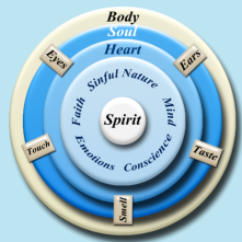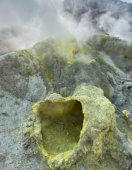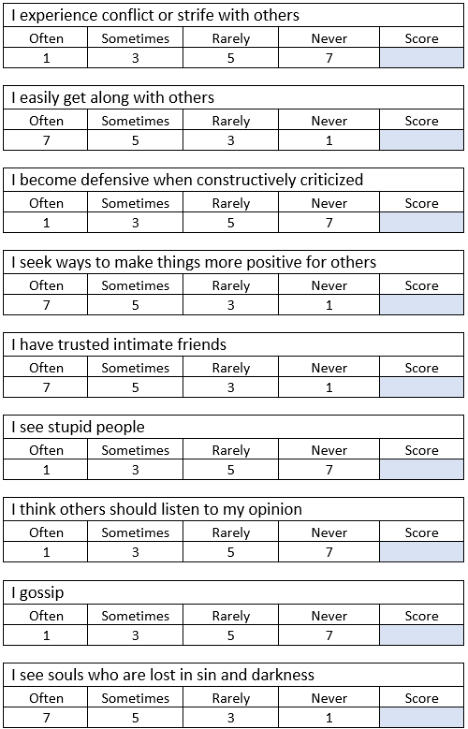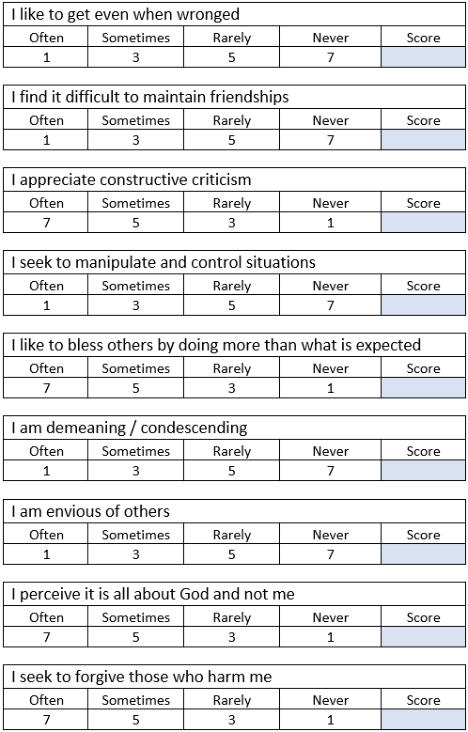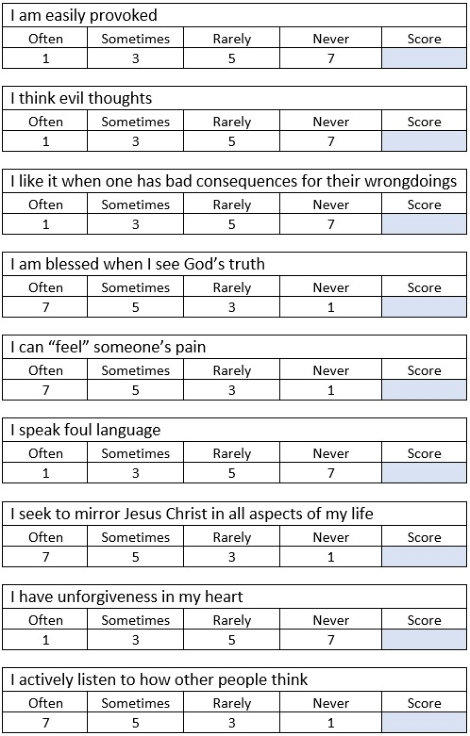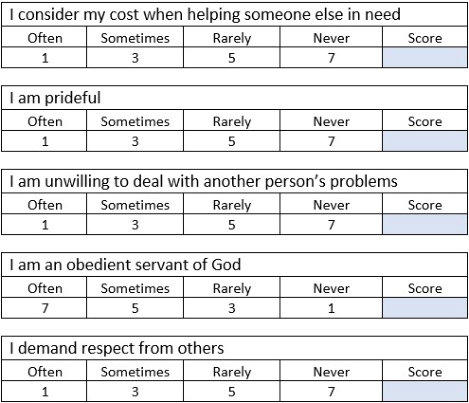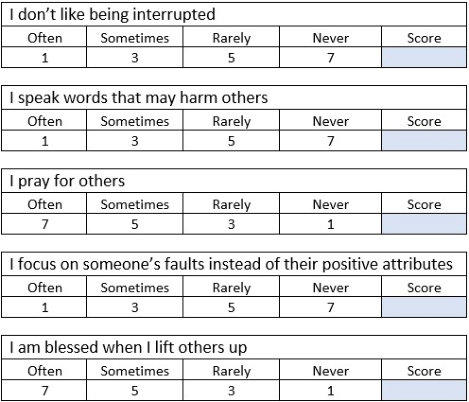
We have a soul
Our
thoughts
and
perceptions
are
often
based
upon
the
physical
realm,
and
usually
focused
upon
those
things
that
are
tangible:
what
we
can
see
and
touch.
However,
there
are
things
that
exist
that
are
not
physical,
and
are
spiritual.
For
example, we have a spiritual body (our soul) that lives inside our physical body. Jesus declared:
•
“For
what
profit
is
it
to
a
man
if
he
gains
the
whole
world,
and
loses
his
own
soul
?
Or
what
will
a
man
give
in
exchange for his
soul
?” Matthew 16:26
•
“Do
not
fear
those
who
kill
the
body
but
cannot
kill
the
soul
.
But
rather
fear
Him
who
is
able
to
destroy
both
soul
and body in hell.” Matthew 10:28
•
“You shall love the Lord your God with all your heart, with all your
soul
, and with all your mind.” Matthew 22:37
“For
the
word
of
God
is
living
and
powerful,
and
sharper
than
any
two-edged
sword,
piercing
even
to
the
division
of
soul
and spirit, and of joints and marrow, and is a discerner of the thoughts and intents of the heart.” Hebrews 4:12
“When
He
opened
the
fifth
seal,
I
saw
under
the
altar
the
souls
of
those
who
had
been
slain
for
the
word
of
God
and
for
the testimony which they held.” Revelation 6:9
Our soul has a personality
The
personality
of
our
soul
is
defined
by
the
combination
of
characteristics
that
form
our
character.
These
characteristics
include
how
we
think,
how
we
express
our
emotions,
our
behavior,
the
words
we
speak,
the
style
of
clothes we wear, and so forth.
What’s
interesting
to
consider
is
each
one
of
us
has
a
one-of-a-kind
soul,
which
is
evidenced
by
our
unique
personalities.
These
differences
are
not
by
random
chance,
but
by
God’s
design.
In
the
same
way
every
snowflake
is
unique, no two persons are alike (physically and spiritually)—which reveals a wonderous aspect of God’s nature.
However, many do not realize our personality:
•
Is an expression of our soul.
•
Can reveal the spiritual status of our soul by how we act and the words we speak.
O
ur soul is comprised of different components
“Now
may
the
God
of
peace
Himself
sanctify
you
completely;
and
may
your
whole
spirit
,
soul
,
and
body
be
preserved
blameless
at
the
coming
of
our
Lord
Jesus
Christ.” 1 Thessalonians 5:23
“For
the
word
of
God
is
living
and
powerful,
and
sharper
than
any
two-edged
sword,
piercing
even
to
the
division
of
soul
and
spirit
,
and
of
joints
and
marrow,
and
is
a
discerner of the thoughts and intents of the heart.” Hebrews 4:12
Jesus
said,
“You
shall
love
the
Lord
your
God
with
all
your
heart
,
with
all
your
soul
,
and with all your mind.” Matthew 22:37
Our
soul
includes
our
spiritual
heart.
Our
soul
is
where
God’s
apportioned
faith
dwells.
Our
soul
is
where
our
sinful
nature
resides.
Our
soul
includes
our
mind.
Our
soul
is
where
our
conscience
is
located.
Our
soul
is
the
source
of
our
wide-array
of
emotions.
Our
soul
encompasses
our
spirit.
And
each
of
these
components—while
separate—are
mysteriously integrated as one. But what’s more important…our soul will never die.
Note
in
the
graphic
above
how
our
physical
senses
(eyes,
ears,
etc.)
provide
a
“communication
link”
between
our
physical body and our soul—which enables our soul to communicate with others within the physical realm.
Our
temporary
physical
body
simply
provides
a
means
for
our
soul
to
move
from
one
place
to
another,
facilitates
interaction
with
the
world
around
us
(to
support
physical
survival),
and
allows
our
soul
to
communicate
with
other
souls
who are encased within their physical bodies.
For additional information on our soul, read “Body, Soul, Heart and Spirit” on UniqueBibleStudies.com.
Our soul was born with a sinful nature
Excluding
Jesus
Christ—who
was
conceived
by
the
Holy
Spirit
(Luke
1:26-35)—every
person
conceived
by
man
and
woman
is
born
spiritually
dead—which
is
demonstrated
by
our
sinful
nature—and
characterized
by
sin,
an
unrepentant
heart, and a desire to avoid/hide from God.
“Therefore,
just
as
through
one
man
sin
entered
the
world,
and
death
through
sin,
and
thus
death
spread
to
all
men,
because all sinned.” Romans 5:12
“For all have sinned and fall short of the glory of God.” Romans 3:23
The
evidence
of
our
sinful
nature
is
revealed
by
our
own
behavior.
It
is
revealed
by
the
darkened
and
destructive
behavior
by
those
whom
we
know,
by
those
within
our
cities,
and
by
those
who
are
leading
nations.
The
sinful
nature
of
our
soul
is
also
evidenced
when
a
child
will
lie
when
they
have
been
caught
doing
something
they
know
is
wrong
(including
adults).
The
child
will
even
deny
the
truth
when
given
factual
evidence
of
their
wrongdoing.
For
example,
a
child
has
cookie
crumbs
on
their
face
and
hands.
The
mother
asks,
“Did
you
eat
the
cookies
I
told
you
not
to
eat
before
dinner?” The child responds, “No.” “Why are there cookie crumbs on your face?” “I don’t know.”
“If we say that we have no sin, we deceive ourselves, and the truth is not in us.” 1 John 1:8
It
is
because
of
the
sinful
nature
of
our
soul
we
are
separated
from
God
and
spiritually
dead
because
of
our
sins.
Ephesians 2:1-3 and Colossians 2:13 declares:
•
We are dead in trespasses and sins.
•
Our behavior seeks to fulfill the lusts of our flesh and mind.
•
We walk according to the prince of the power of the air (Satan).
Jesus said we must be born again.
•
“Unless
one is born again, he cannot see the kingdom of God.” John 3:3
•
“You
must be born again.” John3:5
For
more
information
on
our
sinful
nature
and
what
it
means
to
be
born
again,
read
“3
Types
of
death,
1
Source
of
Life”
and “What is a Born-Again Christian” on UniqueBibleStudies.com.
Our soul has spiritual status indicators
Our
soul
expresses
itself
through
our
physical
body
in
various
ways.
For
example,
our
soul
expresses
itself
by
our
personality,
our
emotions,
the
words
we
speak,
our
behavior,
and
the
love
we
share
with
others.
But
what’s
more,
each
of
these
expressions
can
reveal
the
spiritual
status
of
our
soul—which
may
range
from
being
caustic,
to
amiable,
to
a
soul that expresses God’
s agape love.
The
above
graphic
is
not
based
upon
scientific
analysis
nor
psychological
scrutiny.
It
is
simple,
logical,
and
provides
an
easy
to
understand
and
referenceable
means
to
discern
the
spiritual
status
of
our
soul
and
the
soul
of
others.
As
we
move from left to right, from caustic to agape, we become less like ourselves and more like Jesus.
Caustic Soul
Caustic
is
defined
as
something
that
is
acidic,
corrosive,
destructive,
and
often
poisonous.
From
a
human
interaction
perspective, caustic may also be defined as someone who:
•
Exhibits discomforting behavior that conflicts against our logical senses and mind.
•
Speaks words that can hurt others and destroy relationships.
“Caustic”
is
an
all-encompassing
term
that
describes
a
soul
that
has
an
abrasive
personality,
expresses
irritating
emotions, speaks offensive words, and demonstrates troubling behavior that harms themselves
and others.
Here are terms that define the characteristics of a caustic soul:
Unkind
Bitter
Scathing
Biting
Sarcastic
Hateful
Vicious
Vitriolic
Cruel
Hurtful
Nasty
Spiteful
Vindictive
Mean
Self-centered
The
expression
of
a
caustic
soul
may
be
compared
to
a
fumarole.
A
fumarole
is
a
vent
in
the
earth’s
surface
that
emits
volcanic
gasses
that
stink
and
are
poisonous
to
living
organisms.
Jesus
said,
“But
those
things
which
proceed
out
of
the
mouth
come
from
the
heart,
and
they
defile
a
man.
For
out
of
the
heart
proceed
evil
thoughts,
murders,
adulteries,
fornications,
thefts,
false
witness, blasphemies.” Matthew 15:18-19
Every
person
can
remember
at
least
one
caustic
person
they
have
encountered
during
their
life—including
the
negative
and
emotional
consequences
that
were
experienced.
Plus,
every
one
of
us
can
identify
times
when
we
have
been
caustic
towards
others—including
the
negative
and
emotional
consequences
caused
by
our
actions.
Some
persons,
including
Christians,
may
be
unaware
of
their
causticity.
As
such,
it
is
important
to
continually
evaluate
what flows from our heart—especially our words.
Our
words
are
a
reflection
of
our
soul
and
are
more
powerful
than
we
realize.
Proverbs
4:23
states,
“Keep
your
heart
with
all
diligence,
for
out
of
it
spring
the
issues
of
life.”
Proverbs
18:21
states,
“Death
and
life
are
in
the
power
of
the
tongue.”
“And
the
tongue
is
a
fire,
a
world
of
iniquity.
The
tongue
is
so
set
among
our
members
that
it
defiles
the
whole
body,
and
sets
on
fire
the
course
of
nature;
and
it
is
set
on
fire
by
hell.
For
every
kind
of
beast
and
bird,
of
reptile
and
creature
of
the
sea,
is
tamed
and
has
been
tamed
by
mankind.
But
no
man
can
tame
the
tongue.
It
is
an
unruly
evil,
full
of
deadly
poison.
With
it
we
bless
our
God
and
Father,
and
with
it
we
curse
men,
who
have
been
made
in
the
similitude
of
God.
Out
of
the
same
mouth
proceed
blessing
and
cursing.
My
brethren,
these
things
ought
not
to
be
so.
Does
a
spring
send
forth
fresh
water
and
bitter
from
the
same
opening?
Can
a
fig
tree,
my
brethren,
bear
olives,
or
a
grapevine
bear
figs? Thus no spring yields both salt water and fresh.” James 3:6-12
“Let all bitterness, wrath, anger, clamor, and evil speaking be put away from you, with all malice.” Ephesians 4:31
“But
now
you
yourselves
are
to
put
off
all
these:
anger,
wrath,
malice,
blasphemy,
filthy
language
out
of
your
mouth.”
Colossians 3:8
“Put away from you a deceitful mouth, and put perverse lips far from you.” Proverbs 4:24
“There is one who speaks like the piercings of a sword, but the tongue of the wise promotes health.” Proverbs 12:18
Each
of
the
above
scriptures
speak
to
perils
of
caustic
words.
However,
in
contrast
to
causticity,
agape
love
seeks
to
act
and
speak
in
a
way
that
spiritually
helps
others—and
is
“infused”
with
God’s
grace.
God’s
grace—His
forgiveness
for
who
we
are
and
what
we
have
done—is
the
source
of
the
upwelling
and
overflowing
life-giving
actions
and
words
that
we can share with others.
“Let
no
corrupt
word
proceed
out
of
your
mouth,
but
what
is
good
for
necessary
edification,
that
it
may
impart
grace
to
the hearers.” Ephesians 4:29
“Let
your
speech
always
be
with
grace,
seasoned
with
salt,
that
you
may
know
how
you
ought
to
answer
each
one.”
Colossians 4:6
“Therefore,
as
the
elect
of
God,
holy
and
beloved,
put
on
tender
mercies,
kindness,
humility,
meekness,
longsuffering;
bearing
with
one
another,
and
forgiving
one
another,
if
anyone
has
a
complaint
against
another;
even
as
Christ
forgave
you, so you also must do.” Colossians 3:12-13
“Be kind to one another, tenderhearted, forgiving one another, even as God in Christ forgave you.” Ephesians 4:32
To
learn
more
about
how
forgiveness
can
heal
the
“scars”
and
causticity
within
our
soul,
read
“The
Power
of
Forgiveness,” and “God’s Grace and the Hardened Heart” on UniqueBibleStudies.com.
Reasons why someone may be caustic
Scars from trauma
Trauma
is
when
someone
experiences
something
they
should
not
experience—especially
a
child.
For
example,
witnessing
the
divorce
of
parents;
the
death
of
a
parent;
receiving
physical,
sexual
or
mental
abuse—all
create
deep
scars
within
our
soul.
However,
trauma
may
also
occur
when
someone
does
not
receive
something
they
should
experience.
For
example,
a
child
needs
to
be
raised
in
a
secure
and
loving
environment
that
provides
proper
guidance
and
positive
reinforcement.
The
lack
of
these
much-needed
experiences
as
a
child
can
also
leave
scars.
Traumatic
scars can influence the degree of causticity one expresses as an adult.
Important
Note:
One
who
experienced
childhood
trauma
should
seek
professional
help
in
overcoming
these
barriers
to
spiritual
growth.
However,
there
are
two
key
points
to
consider.
First,
it
is
important
to
forgive
who
caused
the
trauma—because
forgiveness
is
for
the
benefit
of
the
one
who
was
harmed.
Second,
the
one
who
was
traumatized
must
realize
it
was
not
their
fault,
nor
should
they
feel
any
guilt
or
shame.
But
rather,
their
experience
occurred
because
the one responsible for their trauma was living in darkness and was bound by the lies of sin.
Slave to sin
Jesus said,
“Most assuredly, I say to you, whoever commits sin is a slave of sin.” John 8:34
Bob
Dylan—in
his
song
“Gotta
Serve
Somebody,”
wrote
the
words
“You’re
gonna
serve
somebody.
It
may
be
the
devil
or
it
may
be
the
Lord.
But
you’re
gonna
have
to
serve
somebody.”
Virtually
every
Christian
can
relate
to
the
truth
of
Daylan’s
song
because
of
the
addictive
nature
that
causes
one
to
become
enslaved
to
sin.
In
addition,
when
we
are
controlled
by
sin,
we
have
a
higher
propensity
to
be
caustic
because
of
(1)
the
various
means
one
must
justify
their
behavior,
and
(2)
all
of
the
negative
consequences
of
the
sin
such
as
emotional
pain,
shame,
anger,
frustrations,
and
so
forth.
Hardened heart
One
of
the
consequences
of
trauma
and
sin
is
a
hardened
heart.
Trauma
victims
will
create
“defensive
shields”
to
repel,
evade,
thwart,
or
stop
from
being
hurt.
For
those
who
are
in
sin,
the
same
type
of
“defensive
shields”
protects
the
darkness
from
the
light
of
truth.
Meanwhile,
the
heart
hardens,
spiritual
awareness
is
constricted,
reception
of
God’s
grace is obstructed, darkness becomes darker, and causticity rises.
Temptation, trial or tribulation
Going
through
a
temptation,
trial
or
tribulation
can
be
a
stressful
experience
for
both
Christians
and
non-Christians.
These
experiences
may
challenge
our
faith
and
cause
negative
emotions
to
rise.
These
events
may
cause
each
of
us
to
respond with higher degrees of caustic behavior and words—especially if we are experiencing anxiety or fear.
Amiable Soul
An
amiable
soul
is
commonly
defined
as
being
friendly,
pleasant
and
likeable.
In
addition,
an
amiable
person
is
sociable,
unconfrontational,
and
lacks
the
caustic
“barbs”
in
behavior
and
words
that
offends
others.
As
such,
it
is
important
for
Christians to express amiability—such as sharing a smile, speaking positive words, and being sociable.
Amiable
is
a
foundational
prerequisite
in
sharing
agape
love.
However,
being
amiable
does
not
have
the
same
degree
of spiritual influence as when one becomes a vessel for God by expressing an outpouring of His agape love.
Agape Soul
Agape
love
is
the
highest
form
of
love.
It
is
a
pure,
sacrificial
and
willful
resolve
to
elevate
the
welfare
of
others
above
our
own.
But
what’s
more,
humans
are
incapable
of
expressing
agape
love
on
their
own—because
the
source
of
agape
is from God.
“The love of God has been poured out in our hearts by the Holy Spirit who was given to us.” Romans 5:5
Jesus
said,
“Greater
love
has
no
one
than
this,
than
to
lay
down
one’s
life
for
his
friends.”
John
15:13
Jesus
fulfilled
His
declared
truth
(and
as
a
pure
example
of
agape
love)
when
He
willingly
gave
His
life
as
a
sacrifice
and
atonement
for
our
sins.
Jesus
knew
those
who
crucified
Him
were
living
in
darkness
and
sin.
He
also
knew
those
who
crucified
Him
were
manipulated
by
Satan.
He
also
knew
His
death
would
provide
absolute
and
eternal
forgiveness
for
those
who
believe.
After
He
had
been
beaten,
after
He
had
been
mocked,
after
He
had
been
nailed
to
the
cross
to
die
a
horrible
death…He
expressed
His
agape
love
when
He
prayed,
“Father,
forgive
them,
for
they
do
not
know
what
they
do.”
Luke
23:34
Here are terms that define the characteristics of an agape soul:
Caring
Sympathetic
Empathetic
Concerned
Benevolence
Charitable
Gentile
Thoughtful
Compassionate
Kindhearted
Considerate
Selfless
Paul declared our works should be based upon love; and provides examples of soul-driven expressions of love.
“Though
I
speak
with
the
tongues
of
men
and
of
angels,
but
have
not
love,
I
have
become
sounding
brass
or
a
clanging
cymbal.
And
though
I
have
the
gift
of
prophecy,
and
understand
all
mysteries
and
all
knowledge,
and
though
I
have
all
faith,
so
that
I
could
remove
mountains,
but
have
not
love,
I
am
nothing.
And
though
I
bestow
all
my
goods
to
feed
the
poor,
and
though
I
give
my
body
to
be
burned,
but
have
not
love,
it
profits
me
nothing.
Love
suffers
long
and
is
kind;
love
does
not
envy;
love
does
not
parade
itself,
is
not
puffed
up;
does
not
behave
rudely,
does
not
seek
its
own,
is
not
provoked,
thinks
no
evil;
does
not
rejoice
in
iniquity,
but
rejoices
in
the
truth;
bears
all
thing
s,
believes
all
things,
hopes
all things, endures all things.” 1 Corinthians 13:1-7
A
soul
that
expresses
God’s
love
may
be
compared
to
an
upwelling
spring
that
provides
living
water (and a light) for those who are parched and living in darkness. Jesus said:
•
“Whoever
drinks
of
the
water
that
I
shall
give
him
will
never
thirst.
But
the
water
that
I
shall
give him will become in him a fountain of water springing up into everlasting life." John 4:14
•
“He
who
believes
in
Me,
as
the
scripture
has
said,
out
of
his
heart
will
flow
rivers
of
living
water.” John 7:38
Jesus
also
said,
“I
am
the
light
of
the
world.
He
who
follows
Me
shall
not
walk
in
darkness,
but
have the light of life.” John 8:12
The light of Jesus:
•
Illuminates what is hidden in Satan’s darkness.
•
Enables us to see the hidden pain behind the facades displayed by others.
•
Provides insight into those aspects of our soul that need to be transformed into His likeness.
R
elationship between caustic, amiable and agape
Here are some relevant points to consider:
•
Caustic
and
agape
are
incongruous,
discordant,
and
like
oil
and
water,
don’t
mix.
A
caustic
soul
will
have
difficulty
in
expressing God’s agape love.
•
One
who
is
caustic
may
express
varying
degrees
of
amiability,
but
may
be
perceived
as
portraying
conflicting
behavior. For example, one may question why the caustic person is being nice. Is there an ulterior motive?
•
Amiability
and
agape
are
harmonious
and
synergistic.
For
example,
amiability
provides
an
opportunity
to
express
agape.
Conclusion
The
heart
of
every
Christian
soul
should
seek
to
obey
and
love
God.
As
we
obey
and
grow
in
love
with
Him,
He
fills
us
with
His
love
in
return
to
share
with
others.
As
each
day
passes,
and
as
we
are
cleansed
from
within,
we
become
an
improved vessel for God’s grace and love to flow through us—for the benefit of others—and for His glory.
Jesus
said,
“You
shall
love
the
LORD
your
God
with
all
your
heart,
with
all
your
soul,
and
with
all
your
mind.
This
is
the
first
and
great
commandment.
And
the
second
is
like
it:
You
shall
love
your
neighbor
as
yourself.’
On
these
two
commandments hang all the Law and the Prophets.” Matthew 22:37-40
Jesus
also
said,
“A
new
commandment
I
give
to
you,
that
you
love
one
another;
as
I
have
loved
you,
that
you
also
love
one another. By this all will know that you are My disciples, if you have love for one another.” John 13:34-35
The
source
of
love
for
God
and
others
is
found
in
God’s
grace
and
the
love
that
He
extended
to
us
in
His
Son,
Jesus
Christ—who
willingly
died
for
us
so
that
we
can
be
eternally
forgiven
for
our
sins.
Each
time
we
sin
against
God;
each
time
we
realize
the
devastation
that
occurs
from
our
sin;
each
time
we
comprehend
why
God
is
directing
us
away
from
those
things
that
harm
us;
each
time
we
ask
for
forgiveness;
and
each
time
we
experience
God’s
grace
for
what
we
have done…is when we are embraced by God’s love…and we love Him more!
“We love Him because He first loved us.” 1 John 4:19
It
is
only
the
love
of
God
that
can
heal
and
transform
our
soul
so
that
we
can
experience
agape
love
for
Him
and
others.
“Since
you
have
purified
your
souls
in
obeying
the
truth
through
the
Spirit
in
sincere
love
of
the
brethren,
love
one
another
fervently
with
a
pure
heart,
having
been
born
again,
not
of
corruptible
seed
but
incorruptible,
through
the
word
of
God which lives and abides forever.” 1 Peter 1:22-23
“Finally,
all
of
you
be
of
one
mind,
having
compassion
for
one
another;
love
as
brothers,
be
tenderhearted,
be
courteous;
not
returning
evil
for
evil
or
reviling
for
reviling,
but
on
the
contrary
blessing,
knowing
that
you
were
called
to
this,
that
you
may
inherit
a
blessing.
For
he
who
would
love
life
and
see
good
days,
let
him
refrain
his
tongue
from
evil,
and
his
lips
from
speaking
deceit.
Let
him
turn
away
from
evil
and
do
good;
let
him
seek
peace
and
pursue
it.
For
the
eyes
of
the
Lord
are
on
the
righteous,
and
His
ears
are
open
to
their
prayers;
but
the
face
of
the
Lord
is
against
those
who
do
evil.” 1 Peter 3:8-12
“Let
the
words
of
my
mouth
and
the
meditation
of
my
heart
be
acceptable
in
Your
sight,
O
Lord,
my
strength
and
my
Redeemer.” Psalms 19:14
Jesus
said,
“You
are
the
light
of
the
world.
A
city
that
is
set
on
a
hill
cannot
be
hidden.
Nor
do
they
light
a
lamp
and
put
it
under
a
basket,
but
on
a
lampstand,
and
it
gives
light
to
all
who
are
in
the
house.
Let
your
light
so
shine
before
men,
that they may see your good works and glorify your Father in heaven.” Matthew 5:14-16
All for His Glory!
Ha
rold D. Thomas
Self-Analysis Tool
In lieu of quiz questions, this lesson includes a self-analysis tool. This analytical tool is intended to:
•
Be completed individually. It should not be shared in a group setting, but assigned as a personal exercise.
•
Facilitate introspective analysis—thereby providing an opportunity to learn more about ourselves.
•
Identify areas of causticity that may hinder spiritual growth.
•
Spiritually benefit the user.
If possible, it is beneficial to seek the assistance of a trusted friend who:
•
Will maintain strict confidentiality.
•
Knows you well and can be truthfully honest in verifying your selection for each analytical variable.
•
Note:
My
wife
assisted
me
in
completing
the
tool.
I
had
to
change
a
couple
of
my
selections
after
she
“lovingly
challenged” a few of my choices.
“As iron sharpens iron, so a man sharpens the countenance of his friend.” Proverbs 27:17
Entry Instructions
Take time to reflect upon each analytical variable to determine often, sometimes, rarely, or never.
Be honest with yourself when you determine a numeric value for each variable, because this tool is for your benefit.
There are two versions of the self-analysis tool.
•
One is on this web page (below).
•
The other is a PDF version. Download the PDF version by clicking on this button.
If
you
are
using
this
web
page
you
must
manually
write
down
the
value
of
each
analytical
variable
on
paper
and
manually add the total.
If
you
are
using
the
PDF
file
on
a
computer,
you
need
Adobe
Reader
(download
free
from
Play
Store).
Enter
the
numeric
value
for
each
analytical
variable
in
the
right
column.
Use
the
tab
key
to
advance
to
the
next
cell.
The
PDF
file
will automatically sum all entries into a single total at the bottom.
If you are using the PDF file on a cell phone, you must manually enter the numeric value for each analytical variable in
the right column. You must also manually add the total score.
Note: It is important to recognize the individual scores change from analytical variable to variable.
A lower total number = higher causticity
A higher total number = greater agape
No one will get a perfect score because we all fall short of the glory of God. (Romans 3:23)
However, this exercise provides us with insight into the spiritual status of our soul.
Additional
exercise:
Given
the
different
terms
provided
in
the
lesson
below,
identify
one
term
that
best
describes
caustic, and one term that best describes agape.
Here are terms that define the characteristics of a caustic soul:
Unkind
Bitter
Scathing
Biting
Sarcastic
Hateful
Vicious
Vitriolic
Cruel
Hurtful
Nasty
Spiteful
Vindictive
Mean
Self-centered
Here are terms that define the characteristics of an agape soul:
Caring
Sympathetic
Empathetic
Concerned
Benevolence
Charitable
Gentile
Thoughtful
Compassionate
Kindhearted
Considerate
Selfless
Additional exercise:
Identify at least:
•
One thing you discovered about yourself from this lesson.
•
One thing you need to improve by:
o
Praying.
o
Seeking God’s word.
o
Obeying the guidance of the Holy Spirit.
o
Note: Review all analytical variables with a score of 3 or less.




The words of Jesus Christ are in
red text.

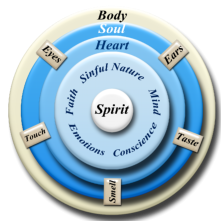




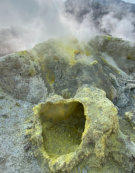





The words of Jesus
are in red text.
We have a soul
Our
thoughts
and
perceptions
are
often
based
upon
the
physical
realm,
and
usually
focused
upon
those
things
that
are
tangible:
what
we
can
see
and
touch.
However,
there
are
things
that
exist
that
are
not
physical,
and
are
spiritual.
For
example,
we
have
a
spiritual
body
(our
soul)
that
lives
inside our physical body. Jesus declared:
•
“For
what
profit
is
it
to
a
man
if
he
gains
the
whole
world,
and
loses
his
own
soul
?
Or
what
will
a
man
give in exchange for his
soul
?” Matthew 16:26
•
“Do
not
fear
those
who
kill
the
body
but
cannot
kill
the
soul
.
But
rather
fear
Him
who
is
able
to
destroy
both
soul
and body in hell.” Matthew 10:28
•
“You
shall
love
the
Lord
your
God
with
all
your
heart,
with
all
your
soul
,
and
with
all
your
mind.”
Matthew
22:37
“For
the
word
of
God
is
living
and
powerful,
and
sharper
than
any
two-edged
sword,
piercing
even
to
the
division
of
soul
and
spirit,
and
of
joints
and
marrow,
and
is
a
discerner
of
the
thoughts
and
intents
of
the
heart.”
Hebrews 4:12
“When
He
opened
the
fifth
seal,
I
saw
under
the
altar
the
souls
of
those
who
had
been
slain
for
the
word
of
God
and for the testimony which they held.” Revelation 6:9
Our soul has a personality
The
personality
of
our
soul
is
defined
by
the
combination
of
characteristics
that
form
our
character.
These
characteristics
include
how
we
think,
how
we
express
our
emotions,
our
behavior,
the
words
we
speak,
the
style
of
clothes we wear, and so forth.
What’s
interesting
to
consider
is
each
one
of
us
has
a
one-
of-a-kind
soul,
which
is
evidenced
by
our
unique
personalities.
These
differences
are
not
by
random
chance,
but
by
God’s
design.
In
the
same
way
every
snowflake
is
unique,
no
two
persons
are
alike
(physically
and
spiritually)—which
reveals
a
wonderous
aspect
of
God’s nature.
However, many do not realize our personality:
•
Is an expression of our soul.
•
Can
reveal
the
spiritual
status
of
our
soul
by
how
we
act and the words we speak.
O
ur soul is comprised of different components
“Now
may
the
God
of
peace
Himself
sanctify
you
completely;
and
may
your
whole
spirit
,
soul
,
and
body
be
preserved
blameless
at
the
coming
of
our
Lord
Jesus
Christ.”
1
Thessalonians 5:23
“For
the
word
of
God
is
living
and
powerful,
and
sharper
than
any
two-
edged
sword,
piercing
even
to
the
division
of
soul
and
spirit
,
and
of
joints
and
marrow,
and
is
a
discerner
of
the
thoughts and intents of the heart.” Hebrews 4:12
Jesus
said,
“You
shall
love
the
Lord
your
God
with
all
your
heart
,
with
all
your
soul
,
and
with
all
your
mind.”
Matthew
22:37
Our
soul
includes
our
spiritual
heart.
Our
soul
is
where
God’s
apportioned
faith
dwells.
Our
soul
is
where
our
sinful
nature
resides.
Our
soul
includes
our
mind.
Our
soul
is
where
our
conscience
is
located.
Our
soul
is
the
source
of
our
wide-array
of
emotions.
Our
soul
encompasses
our
spirit.
And
each
of
these
components—while
separate—are
mysteriously
integrated
as
one.
But
what’s
more
important…our
soul
will
never
die.
Note
in
the
graphic
above
how
our
physical
senses
(eyes,
ears,
etc.)
provide
a
“communication
link”
between
our
physical
body
and
our
soul—which
enables
our
soul
to
communicate with others within the physical realm.
Our
temporary
physical
body
simply
provides
a
means
for
our
soul
to
move
from
one
place
to
another,
facilitates
interaction
with
the
world
around
us
(to
support
physical
survival),
and
allows
our
soul
to
communicate
with
other
souls who are encased within their physical bodies.
For
additional
information
on
our
soul,
read
“Body,
Soul,
Heart and Spirit” on UniqueBibleStudies.com.
Our soul was born with a sinful nature
Excluding
Jesus
Christ—who
was
conceived
by
the
Holy
Spirit
(Luke
1:26-35)—every
person
conceived
by
man
and
woman
is
born
spiritually
dead—which
is
demonstrated
by
our
sinful
nature—and
characterized
by
sin,
an
unrepentant
heart,
and
a
desire
to
avoid/hide
from
God.
“Therefore,
just
as
through
one
man
sin
entered
the
world,
and
death
through
sin,
and
thus
death
spread
to
all
men,
because all sinned.” Romans 5:12
“For
all
have
sinned
and
fall
short
of
the
glory
of
God.”
Romans 3:23
The
evidence
of
our
sinful
nature
is
revealed
by
our
own
behavior.
It
is
revealed
by
the
darkened
and
destructive
behavior
by
those
whom
we
know,
by
those
within
our
cities,
and
by
those
who
are
leading
nations.
The
sinful
nature
of
our
soul
is
also
evidenced
when
a
child
will
lie
when
they
have
been
caught
doing
something
they
know
is
wrong
(including
adults).
The
child
will
even
deny
the
truth
when
given
factual
evidence
of
their
wrongdoing.
For
example,
a
child
has
cookie
crumbs
on
their
face
and
hands.
The
mother
asks,
“Did
you
eat
the
cookies
I
told
you
not
to
eat
before
dinner?”
The
child
responds,
“No.”
“Why
are
there
cookie
crumbs
on
your
face?”
“I
don’t
know.”
“If
we
say
that
we
have
no
sin,
we
deceive
ourselves,
and
the truth is not in us.” 1 John 1:8
It
is
because
of
the
sinful
nature
of
our
soul
we
are
separated
from
God
and
spiritually
dead
because
of
our
sins. Ephesians 2:1-3 and Colossians 2:13 declares:
•
We are dead in trespasses and sins.
•
Our
behavior
seeks
to
fulfill
the
lusts
of
our
flesh
and
mind.
•
We
walk
according
to
the
prince
of
the
power
of
the
air
(Satan).
Jesus said we must be born again.
•
“Unless
one
is
born
again,
he
cannot
see
the
kingdom
of God.” John 3:3
•
“You
must be born again.” John3:5
For
more
information
on
our
sinful
nature
and
what
it
means
to
be
born
again,
read
“3
Types
of
death,
1
Source
of
Life”
and
“What
is
a
Born-Again
Christian”
on
UniqueBibleStudies.com.
Our soul has spiritual status indicators
Our
soul
expresses
itself
through
our
physical
body
in
various
ways.
For
example,
our
soul
expresses
itself
by
our
personality,
our
emotions,
the
words
we
speak,
our
behavior,
and
the
love
we
share
with
others.
But
what’s
more,
each
of
these
expressions
can
reveal
the
spiritual
status
of
our
soul—which
may
range
from
being
caustic,
t
o amiable, to a soul that expresses God’s agape love.
The
above
graphic
is
not
based
upon
scientific
analysis
nor
psychological
scrutiny.
It
is
simple,
logical,
and
provides
an
easy
to
understand
and
referenceable
means
to
discern
the
spiritual
status
of
our
soul
and
the
soul
of
others.
As
we
move
from
left
to
right,
from
caustic
to
agape,
we
become
less
like
ourselves
and
more
like
Jesus.
Caustic Soul
Caustic
is
defined
as
something
that
is
acidic,
corrosive,
destructive,
and
often
poisonous.
From
a
human
interaction
perspective,
caustic
may
also
be
defined
as
someone who:
•
Exhibits
discomforting
behavior
that
conflicts
against
our logical senses and mind.
•
Speaks
words
that
can
hurt
others
and
destroy
relationships.
“Caustic”
is
an
all-encompassing
term
that
describes
a
soul
that
has
an
abrasive
personality,
expresses
irritating
emotions,
speaks
offensive
words,
and
demonstrates
troubling behavior that harms themselves
and others.
Here
are
terms
that
define
the
characteristics of a caustic soul:
Unkind
Bitter
Scathing
Bitin
Sarcastic Hateful
Vicious
Vitriolic
Cruel
Hurtful Nasty
Spiteful
Vindictive Mean
Self-centered
The
expression
of
a
caustic
soul
may
be
compared
to
a
fumarole.
A
fumarole
is
a
vent
in
the
earth’s
surface
that
emits
volcanic
gasses
that
stink
and
are
poisonous
to
living
organisms.
Jesus
said,
“But
those
things
which
proceed
out
of
the
mouth
come
from
the
heart,
and
they
defile
a
man.
For
out
of
the
heart
proceed
evil
thoughts,
murders,
adulteries,
fornications,
thefts,
false
witness,
blasphemies.” Matthew 15:18-19
Every
person
can
remember
at
least
one
caustic
person
they
have
encountered
during
their
life—including
the
negative
and
emotional
consequences
that
were
experienced.
Plus,
every
one
of
us
can
identify
times
when
we
have
been
caustic
towards
others—including
the
negative
and
emotional
consequences
caused
by
our
actions.
Some
persons,
including
Christians,
may
be
unaware
of
their
causticity.
As
such,
it
is
important
to
continually
evaluate what flows from our heart—especially our words.
Our
words
are
a
reflection
of
our
soul
and
are
more
powerful
than
we
realize.
Proverbs
4:23
states,
“Keep
your
heart
with
all
diligence,
for
out
of
it
spring
the
issues
of
life.”
Proverbs
18:21
states,
“Death
and
life
are
in
the
power of the tongue.”
“And
the
tongue
is
a
fire,
a
world
of
iniquity.
The
tongue
is
so
set
among
our
members
that
it
defiles
the
whole
body,
and
sets
on
fire
the
course
of
nature;
and
it
is
set
on
fire
by
hell.
For
every
kind
of
beast
and
bird,
of
reptile
and
creature
of
the
sea,
is
tamed
and
has
been
tamed
by
mankind.
But
no
man
can
tame
the
tongue.
It
is
an
unruly
evil,
full
of
deadly
poison.
With
it
we
bless
our
God
and
Father,
and
with
it
we
curse
men,
who
have
been
made
in
the
similitude
of
God.
Out
of
the
same
mouth
proceed
blessing
and
cursing.
My
brethren,
these
things
ought
not
to
be
so.
Does
a
spring
send
forth
fresh
water
and
bitter
from
the
same
opening?
Can
a
fig
tree,
my
brethren,
bear
olives,
or
a
grapevine
bear
figs?
Thus
no
spring
yields
both salt water and fresh.” James 3:6-12
“Let
all
bitterness,
wrath,
anger,
clamor,
and
evil
speaking
be put away from you, with all malice.” Ephesians 4:31
“But
now
you
yourselves
are
to
put
off
all
these:
anger,
wrath,
malice,
blasphemy,
filthy
language
out
of
your
mouth.” Colossians 3:8
“Put
away
from
you
a
deceitful
mouth,
and
put
perverse
lips far from you.” Proverbs 4:24
“There
is
one
who
speaks
like
the
piercings
of
a
sword,
but
the
tongue
of
the
wise
promotes
health.”
Proverbs
12:18
Each
of
the
above
scriptures
speak
to
perils
of
caustic
words.
However,
in
contrast
to
causticity,
agape
love
seeks
to
act
and
speak
in
a
way
that
spiritually
helps
others—and
is
“infused”
with
God’s
grace.
God’s
grace—His
forgiveness
for
who
we
are
and
what
we
have
done—is
the
source
of
the
upwelling
and
overflowing
life-
giving actions and words that we can share with others.
“Let
no
corrupt
word
proceed
out
of
your
mouth,
but
what
is
good
for
necessary
edification,
that
it
may
impart
grace
to the hearers.” Ephesians 4:29
“Let
your
speech
always
be
with
grace,
seasoned
with
salt,
that
you
may
know
how
you
ought
to
answer
each
one.” Colossians 4:6
“Therefore,
as
the
elect
of
God,
holy
and
beloved,
put
on
tender
mercies,
kindness,
humility,
meekness,
longsuffering;
bearing
with
one
another,
and
forgiving
one
another,
if
anyone
has
a
complaint
against
another;
even
as
Christ
forgave
you,
so
you
also
must
do.”
Colossians
3:12-13
“Be
kind
to
one
another,
tenderhearted,
forgiving
one
another,
even
as
God
in
Christ
forgave
you.”
Ephesians
4:32
To
learn
more
about
how
forgiveness
can
heal
the
“scars”
and
causticity
within
our
soul,
read
“The
Power
of
Forgiveness,”
and
“God’s
Grace
and
the
Hardened
Heart”
on UniqueBibleStudies.com.
Reasons why someone may be caustic
Scars from trauma
Trauma
is
when
someone
experiences
something
they
should
not
experience—especially
a
child.
For
example,
witnessing
the
divorce
of
parents;
the
death
of
a
parent;
receiving
physical,
sexual
or
mental
abuse—all
create
deep
scars
within
our
soul.
However,
trauma
may
also
occur
when
someone
does
not
receive
something
they
should
experience.
For
example,
a
child
needs
to
be
raised
in
a
secure
and
loving
environment
that
provides
proper
guidance
and
positive
reinforcement.
The
lack
of
these
much-needed
experiences
as
a
child
can
also
leave
scars.
Traumatic
scars
can
influence
the
degree
of
causticity one expresses as an adult.
Important
Note:
One
who
experienced
childhood
trauma
should
seek
professional
help
in
overcoming
these
barriers
to
spiritual
growth.
However,
there
are
two
key
points
to
consider.
First,
it
is
important
to
forgive
who
caused
the
trauma—because
forgiveness
is
for
the
benefit
of
the
one
who
was
harmed.
Second,
the
one
who
was
traumatized
must
realize
it
was
not
their
fault,
nor
should
they
feel
any
guilt
or
shame.
But
rather,
their
experience
occurred
because
the
one
responsible
for
their
trauma
was living in darkness and was bound by the lies of sin.
Slave to sin
Jesus
said,
“Most
assuredly,
I
say
to
you,
whoever
commits sin is a slave of sin.” John 8:34
Bob
Dylan—in
his
song
“Gotta
Serve
Somebody,”
wrote
the
words
“You’re
gonna
serve
somebody.
It
may
be
the
devil
or
it
may
be
the
Lord.
But
you’re
gonna
have
to
serve
somebody.”
Virtually
every
Christian
can
relate
to
the
truth
of
Daylan’s
song
because
of
the
addictive
nature
that
causes
one
to
become
enslaved
to
sin.
In
addition,
when
we
are
controlled
by
sin,
we
have
a
higher
propensity
to
be
caustic
because
of
(1)
the
various
means
one
must
justify
their
behavior,
and
(2)
all
of
the
negative
consequences
of
the
sin
such
as
emotional
pain,
shame,
anger, frustrations, and so forth.
Hardened heart
One
of
the
consequences
of
trauma
and
sin
is
a
hardened
heart.
Trauma
victims
will
create
“defensive
shields”
to
repel,
evade,
thwart,
or
stop
from
being
hurt.
For
those
who
are
in
sin,
the
same
type
of
“defensive
shields”
protects
the
darkness
from
the
light
of
truth.
Meanwhile,
the
heart
hardens,
spiritual
awareness
is
constricted,
reception
of
God’s
grace
is
obstructed,
darkness
becomes
darker, and causticity rises.
Temptation, trial or tribulation
Going
through
a
temptation,
trial
or
tribulation
can
be
a
stressful
experience
for
both
Christians
and
non-
Christians.
These
experiences
may
challenge
our
faith
and
cause
negative
emotions
to
rise.
These
events
may
cause
each
of
us
to
respond
with
higher
degrees
of
caustic
behavior
and
words—especially
if
we
are
experiencing anxiety or fear.
Amiable Soul
An
amiable
soul
is
commonly
defined
as
being
friendly,
pleasant
and
likeable.
In
addition,
an
amiable
person
is
sociable,
unconfrontational,
and
lacks
the
caustic
“barbs”
in
behavior
and
words
that
offends
others.
As
such,
it
is
important
for
Christians
to
express
amiability—such
as
sharing
a
smile,
speaking
positive
words,
and
being
sociable.
Amiable
is
a
foundational
prerequisite
in
sharing
agape
love.
However,
being
amiable
does
not
have
the
same
degree
of
spiritual
influence
as
when
one
becomes
a
vessel
for
God
by
expressing
an
outpouring
of
His
agape
love.
Agape Soul
Agape
love
is
the
highest
form
of
love.
It
is
a
pure,
sacrificial
and
willful
resolve
to
elevate
the
welfare
of
others
above
our
own.
But
what’s
more,
humans
are
incapable
of
expressing
agape
love
on
their
own—because
the
source
of
agape
is
from
God.
“The
love
of
God
has
been
poured
out
in
our
hearts
by
the
Holy
Spirit who was given to us.” Romans 5:5
Jesus
said,
“Greater
love
has
no
one
than
this,
than
to
lay
down
one’s
life
for
his
friends.”
John
15:13
Jesus
fulfilled
His
declared
truth
(and
as
a
pure
example
of
agape
love)
when
He
willingly
gave
His
life
as
a
sacrifice
and
atonement
for
our
sins.
Jesus
knew
those
who
crucified
Him
were
living
in
darkness
and
sin.
He
also
knew
those
who
crucified
Him
were
manipulated
by
Satan.
He
also
knew
His
death
would
provide
absolute
and
eternal
forgiveness
for
those
who
believe.
After
He
had
been
beaten,
after
He
had
been
mocked,
after
He
had
been
nailed
to
the
cross
to
die
a
horrible
death…He
expressed
His
agape
love
when
He
prayed,
“Father,
forgive
them,
for
they do not know what they do.” Luke 23:34
Here
are
terms
that
define
the
characteristics
of
an
agape
soul:
Caring
Sympathetic
Empathetic
Concerned
Benevolence
Charitable
Gentile
Thoughtful
Compassionate
Kindhearted
Considerate
Selfless
Paul
declared
our
works
should
be
based
upon
love;
and
provides examples of soul-driven expressions of love.
“Though
I
speak
with
the
tongues
of
men
and
of
angels,
but
have
not
love,
I
have
become
sounding
brass
or
a
clanging
cymbal.
And
though
I
have
the
gift
of
prophecy,
and
understand
all
mysteries
and
all
knowledge,
and
though
I
have
all
faith,
so
that
I
could
remove
mountains,
but
have
not
love,
I
am
nothing.
And
though
I
bestow
all
my
goods
to
feed
the
poor,
and
though
I
give
my
body
to
be
burned,
but
have
not
love,
it
profits
me
nothing.
Love
suffers
long
and
is
kind;
love
does
not
envy;
love
does
not
parade
itself,
is
not
puffed
up;
does
not
behave
rudely,
does
not
seek
its
own,
is
not
provoked,
thinks
no
evil;
does
not
rejoice
in
iniquity,
but
rejoices
in
the
truth;
bears
all
things,
believes
all
things,
hopes
all
things,
endures
all
things.” 1 Corinthians 13:1-7
A
soul
that
expresses
God’s
love
may
be
compared
to
an
upwelling
spring
that
provides
living
water
(and
a
light)
for
those who are parched and living in darkness
. Jesus said:
•
“Whoever
drinks
of
the
water
that
I
shall
give
him
will
never
thirst.
But
the
water
that
I
shall
give
him
will
become
in
him
a
fountain
of
water
springing
up
into
everlasting
life."
John 4:14
•
“He
who
believes
in
Me,
as
the
scripture
has
said,
out
of
his
heart
will
flow
rivers
of
living
water.”
John
7:38
Jesus
also
said,
“I
am
the
light
of
the
world.
He
who
follows
Me
shall
not
walk
in
darkness,
but
have
the
light
of
life.” John 8:12
The light of Jesus:
•
Illuminates what is hidden in Satan’s darkness.
•
Enables
us
to
see
the
hidden
pain
behind
the
facades
displayed by others.
•
Provides
insight
into
those
aspects
of
our
soul
that
need to be transformed into His likeness.
R
elationship
between
caustic,
amiable
and
agape
Here are some relevant points to consider:
•
Caustic
and
agape
are
incongruous,
discordant,
and
like
oil
and
water,
don’t
mix.
A
caustic
soul
will
have
difficulty in expressing God’s agape love.
•
One
who
is
caustic
may
express
varying
degrees
of
amiability,
but
may
be
perceived
as
portraying
conflicting
behavior.
For
example,
one
may
question
why
the
caustic
person
is
being
nice.
Is
there
an
ulterior motive?
•
Amiability
and
agape
are
harmonious
and
synergistic.
For
example,
amiability
provides
an
opportunity
to
express agape.
Conclusion
The
heart
of
every
Christian
soul
should
seek
to
obey
and
love
God.
As
we
obey
and
grow
in
love
with
Him,
He
fills
us
with
His
love
in
return
to
share
with
others.
As
each
day
passes,
and
as
we
are
cleansed
from
within,
we
become
an
improved
vessel
for
God’s
grace
and
love
to
flow
through
us—for
the
benefit
of
others—and
for
His
glory.
Jesus
said,
“You
shall
love
the
LORD
your
God
with
all
your
heart,
with
all
your
soul,
and
with
all
your
mind.
This
is
the
first
and
great
commandment.
And
the
second
is
like
it:
You
shall
love
your
neighbor
as
yourself.’
On
these
two
commandments
hang
all
the
Law
and
the
Prophets.”
Matthew 22:37-40
Jesus
also
said,
“A
new
commandment
I
give
to
you,
that
you
love
one
another;
as
I
have
loved
you,
that
you
also
love
one
another.
By
this
all
will
know
that
you
are
My
disciples, if you have love for one another.” John 13:34-35
The
source
of
love
for
God
and
others
is
found
in
God’s
grace
and
the
love
that
He
extended
to
us
in
His
Son,
Jesus
Christ—who
willingly
died
for
us
so
that
we
can
be
eternally
forgiven
for
our
sins.
Each
time
we
sin
against
God;
each
time
we
realize
the
devastation
that
occurs
from
our
sin;
each
time
we
comprehend
why
God
is
directing
us
away
from
those
things
that
harm
us;
each
time
we
ask
for
forgiveness;
and
each
time
we
experience
God’s
grace
for
what
we
have
done…is
when
we
are
embraced by God’s love…and we love Him more!
“We love Him because He first loved us.” 1 John 4:19
It
is
only
the
love
of
God
that
can
heal
and
transform
our
soul
so
that
we
can
experience
agape
love
for
Him
and
others.
“Since
you
have
purified
your
souls
in
obeying
the
truth
through
the
Spirit
in
sincere
love
of
the
brethren,
love
one
another
fervently
with
a
pure
heart,
having
been
born
again,
not
of
corruptible
seed
but
incorruptible,
through
the
word
of
God
which
lives
and
abides
forever.”
1
Peter
1:22-23
“Finally,
all
of
you
be
of
one
mind,
having
compassion
for
one
another;
love
as
brothers,
be
tenderhearted,
be
courteous;
not
returning
evil
for
evil
or
reviling
for
reviling,
but
on
the
contrary
blessing,
knowing
that
you
were
called
to
this,
that
you
may
inherit
a
blessing.
For
he
who
would
love
life
and
see
good
days,
let
him
refrain
his
tongue
from
evil,
and
his
lips
from
speaking
deceit.
Let
him
turn
away
from
evil
and
do
good;
let
him
seek
peace
and
pursue
it.
For
the
eyes
of
the
Lord
are
on
the
righteous,
and
His
ears
are
open
to
their
prayers;
but
the
face
of
the
Lord
is
against those who do evil.” 1 Peter 3:8-12
“Let
the
words
of
my
mouth
and
the
meditation
of
my
heart
be
acceptable
in
Your
sight,
O
Lord,
my
strength
and
my
Redeemer.” Psalms 19:14
Jesus
said,
“You
are
the
light
of
the
world.
A
city
that
is
set
on
a
hill
cannot
be
hidden.
Nor
do
they
light
a
lamp
and
put
it
under
a
basket,
but
on
a
lampstand,
and
it
gives
light
to
all
who
are
in
the
house.
Let
your
light
so
shine
before
men,
that
they
may
see
your
good
works
and
glorify
your
Father in heaven.” Matthew 5:14-16
All for His Glory!
Harold D. Thomas
Self-Analysis Tool
I
n
lieu
of
quiz
questions,
this
lesson
includes
a
self-
analysis tool. This analytical tool is intended to:
•
Be
completed
individually.
It
should
not
be
shared
in
a
group setting, but assigned as a personal exercise.
•
Facilitate
introspective
analysis—thereby
providing
an
opportunity to learn more about ourselves.
•
Identify
areas
of
causticity
that
may
hinder
spiritual
growth.
•
Spiritually benefit the user.
If
possible,
it
is
beneficial
to
seek
the
assistance
of
a
trusted friend who:
•
Will maintain strict confidentiality.
•
Knows
you
well
and
can
be
truthfully
honest
in
verifying
your selection for each analytical variable.
•
Note:
My
wife
assisted
me
in
completing
the
tool.
I
had
to
change
a
couple
of
my
selections
after
she
“lovingly
challenged” a few of my choices.
“As
iron
sharpens
iron,
so
a
man
sharpens
the
countenance of his friend.” Proverbs 27:17
Entry Instructions
Take
time
to
reflect
upon
each
analytical
variable
to
determine often, sometimes, rarely, or never.
Be
honest
with
yourself
when
you
determine
a
numeric
value
for
each
variable,
because
this
tool
is
for
your
benefit.
There are two versions of the self-analysis too
l.
•
One is on this web page (below).
•
The
other
is
a
downloadable
PDF
file.
(Cick the PDF button to download).
If
you
are
using
this
web
page
you
must
write
down
the
value
of
each
analytical
variable
on
paper
and
add
manually the total.
You
need
Adobe
Reader
(download
free
from
Play
Store)
to
use
the
PDF
file
on
a
cell
phone.
Enter
the
numeric
value
for
each
analytical
variable
in
the
right
column,
then
select
the
next
cell.
The
PDF
file
will
automatically
sum
all
entries into a single total at the bottom.
A lower total number = higher causticity
A higher total number = greater agape
No
one
will
get
a
perfect
score
because
we
all
fall
short
of
the glory of God. (Romans 3:23)
However,
this
exercise
provides
us
with
insight
into
the
spiritual status of our soul.
Additional
exercise:
Given
the
different
terms
provided
in
the
lesson
below,
identify
one
term
that
best
describes
caustic, and one term that best describes agape.
Here
are
terms
that
define
the
characteristics
of
a
caustic
soul:
Unkind
Bitter
Scathing
Biting
Sarcastic
Hateful
Vicious
Vitriolic
Cruel
Hurtful
Nasty
Spiteful
Vindictive
Mean
Self-centered
Here
are
terms
that
define
the
characteristics
of
an
agape
soul:
Caring
Sympathetic
Empathetic
Concerned
Benevolence
Charitable
Gentile
Thoughtful
Compassionate
Kindhearted
Considerate
Selfless
Additional exercise:
Identify at least:
•
One
thing
you
discovered
about
yourself
from
this
lesson.
•
One thing you need to improve by:
o
Praying.
o
Seeking God’s word.
o
Obeying the guidance of the Holy Spirit.
o
Note:
Review
all
analytical
variables
with
a
score
of
3 or less.

